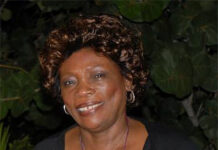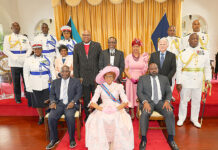Elderly persons take part in the Ministry of Health & Social Development’s Older Persons Forum held Wednesday morning at the Transfiguration Baptist Church. (BIS Photo/Patrick Hanna)
By: Matt Maura
NASSAU, Bahamas – Representatives of Retired Persons Associations throughout the country are being encouraged to register their associations with the Department of Social Services in order to facilitate the creation of a national database for older persons.
Mrs. Marva Russell-Minns, Deputy Director of the Department of Social Services’ Senior Citizens Division said the database will allow officials charged with the care and responsibility for the country’s older persons to keep track of all of the associations operating within the country, while also ensuring that their members receive all of the benefits that are available to them.
She said associations will also be able to tap into the myriad of programmes, activities and partnerships that have been established between the Government of The Bahamas, the Department, the National Council on Older Persons and various corporate and other sponsors.
Mrs. Russell-Minns added that the creation and establishment of the database comes at an opportune time as life expectancies are on the increase in First World and Developing countries.
The Department is already working closely with a number of Senior Citizens Associations.
“We know there are organizations out there that are meeting (and) we have invited all of those that we know about to let us know where they meet so that we can get those older persons who are not involved in any programmes involved,” Mrs. Russell-Minns said.
“It is very important that they have interaction with their peers, in addition to educating them on how to access the products and services that are available to them.
“The construction of this database will allow us to find out how many retired persons organizations there are, how they function and to get from them any issues the Government needs to know about to be able to better assist older persons on a national level,” Mrs. Russell-Minns added.
According to United Nations’ projections, the number of persons aged 60 or over will expand from an estimated 629 million in 2002 to almost 2 billion by the year 2050, which will be unprecedented in the annals of human history. The number of older persons in society is expected to outdistance the number of children by 2050.
U.N. figures further show that one-third of the population in countries considered to be “rich” will be 60 years or older by 2050, up from the current figures of one-fifth, while the numbers will jump from 8 per cent to 20 per cent of the population in countries that are considered “poor.”
Among older persons, those persons 80 and over are the fastest growing social group in the world. Their numbers are expected to increase from 86 million in 2005 to 394 million in 2050.
Mrs. Russell-Minns said societies should not perceive older persons as “burdens” as many of them still contribute greatly at the socio-economic development of The Bahamas.
She pointed out that many older persons act as caregivers for their grandchildren and great grandchildren, thus taking on huge financial and emotional burdens late in life. Older persons are also considered to be critical to the cultural development of a nation as in addition to keeping families together, they pass on their experiences, values and cultural heritage to the younger generations.
Mrs. Russell-Minns said it is also important to involve older persons in general development programmes as excluding them only makes them more invisible and vulnerable.
She noted that in this regard the Senior Citizens Division, in conjunction with the National Council on Older Persons, has established a number of programmes, training sessions and activities in order to ensure that the country’s older persons enjoy an active and fulfilling life.
One such activity is the computer literacy programme for functional older persons which she said has had tremendous success.
“As a result of these classes, many of the older persons are now communicating with relatives both locally and abroad by email, others are shopping and conducting business online while others now have the capability to prepare their own letters rather than having to write those letters and have someone type them out for them,” Mrs. Russell-Minns added.
“Every year we try to establish new activities and programmes based on our response from the older persons involved in the programme,” Mrs. Russell-Minns said.






![A Con Artist [RACIST] wants Bahamians to fight progress – WELL, WHAT IS THIS?!](https://www.bahamaspress.com/wp-content/uploads/2025/07/Toby-Smith-218x150.jpg)


